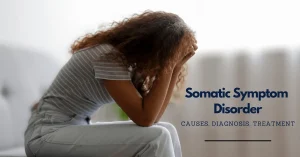Introduction
Somatic health refers to the well-being of the body, especially as it relates to how physical health interacts with emotional and mental states. Unlike a purely medical perspective, somatic health considers the body as a vital communicator of stress, trauma, and emotional balance. In today’s fast-paced world, understanding and enhancing your somatic health can lead to more resilient physical and psychological well-being.
This article explores five powerful, natural ways to improve your somatic health and develop a deeper connection between your mind and body.

If you need professional support, consulting the best psychiatrist in Delhi can provide valuable insights and personalized strategies for Phobias. Consider Visiting:
What Is Somatic Health?
Somatic health focuses on the awareness of bodily sensations and how they relate to mental and emotional states. The term “somatic” comes from the Greek word soma, meaning body. Rather than treating the body and mind as separate entities, somatic practices encourage a holistic approach, fostering balance and self-awareness.
Somatic health is not only about the absence of illness but about thriving—physically, emotionally, and mentally.
1. Practice Mindful Body Awareness
One of the core principles of somatic health is being present in your body. Mindful body awareness involves paying attention to physical sensations—such as breathing, tension, or posture—without judgment. This helps you tune into signs of stress or emotional discomfort before they escalate.
Try this: Set aside 5–10 minutes a day to sit quietly, scan your body from head to toe, and notice any sensations.
For more info you can also visit: National Center for Complementary and Integrative Health (NIH)
2. Engage in Somatic Movement Practices
Physical movement is a key factor in maintaining somatic health. Gentle practices like yoga, tai chi, and walking help release muscular tension and promote physical alignment. These activities improve circulation, flexibility, and body-mind coordination.
Somatic movement helps integrate emotional experiences and physical health, enabling you to respond better to daily stressors.
3. Prioritize Sleep and Restorative Activities
Rest plays a critical role in somatic health. Lack of sleep or constant physical exhaustion can disrupt the body’s natural healing and regulatory processes. Quality rest allows the nervous system to reset and recharge, which is essential for physical and mental well-being.
Establish a regular sleep schedule and engage in calming pre-sleep routines like deep breathing or light stretching to improve rest.

4. Regulate Stress Through Breathwork and Relaxation
Breath is a bridge between the body and mind. Deep, conscious breathing activates the parasympathetic nervous system, reducing stress and promoting calm. Techniques like diaphragmatic breathing, box breathing, or simple breath counting are excellent tools for enhancing somatic health.
Daily breathwork can improve focus, reduce physical tension, and foster emotional balance.
5. Build Healthy Body-Mind Communication Through Journaling
Writing about physical sensations and emotional experiences can deepen your understanding of your body’s signals. Somatic journaling helps you connect specific thoughts or feelings to physical reactions, offering insights into stress triggers and body awareness.
Include prompts such as:
This practice builds a bridge between the cognitive and physical self, nurturing overall somatic wellness.

Final Thoughts: Empower Your Somatic Health Journey
Improving somatic health isn’t about rigid routines or drastic changes—it’s about cultivating awareness, movement, and care for your body in simple, consistent ways. By tuning in to your body’s wisdom and nurturing it through gentle practices, you create a strong foundation for holistic health.
Whether it’s mindful movement, restful sleep, or breath awareness, each step you take builds resilience and harmony within your body and mind.
Remember: Real change comes through small, consistent efforts. Start with one practice today and feel the difference in your somatic well-being.